R2AK Time Machine Day 6/25
Published on June 21st, 2020
For five years, the Race to Alaska, a 750-mile course from Port Townsend, Washington to Ketchikan, Alaska, proved that journey trumps destination, and while COVID-19 cancelled the 2020 edition, the Organizing Authority is, for 25 days, sharing their fondest memories from the previous races. Enjoy!
In 2018 Team Sail Like a Girl (above) battled their way into history as the first monohull to win the Race to Alaska AND the first all-woman crew to take it as well. Eight women in a Melges 30 held together as much by sponsor logos as gel coat.
READ:
2018 Day 7: Sailing victorious on the wind of together
There was something different about tonight; everyone felt it. From the crowd of families and fans who gathered at the Alaskan Fish House to watch and wait, to the manager who stayed to keep the place open three hours beyond her normal, kids in tow, to support the proud and expectant crowd with the dry/booze/coffee of an Alaskan welcome, to the tracker fans from around the globe who stayed up well past prudent to be a part of this moment from whatever time zone their well-wishing required.
All sought the moment when seven women stepped simultaneous, arm-in-arm, off their Melges 32 to ring the bell of victory for First Federal’s Team Sail Like a Girl at 00:17 local time and became the fourth champions of the R2AK—from whatever moment along that spectrum of incredible—it was clear the spirit of community supplanted individual ambition as the central force carrying this year’s $10k winners into the rare air of R2AK glory.
As much as this was a win for any one of them, to a sailor, they said, it was a win for everyone.
“Six months ago, I had my doubts,” a family member confided in the hours leading up to their victory. Before the New Year’s ball fell and ushered in a new calendar, Team Sail Like a Girl was an idea and a 20-year-old race boat purchased based on a single theory: let’s race a team of women to Alaska.
The odds were stacked against them: a monohull had never won the R2AK, the pure speed advantage of multihulls loomed large as a forgone conclusion in a race with no handicaps. Beyond the boat, the crew assembled ran the gamut of experience. “Really, only about half of them were sailors when they started…one of them learned to sail just to be on the team,” a fact that led several potential crew with real deal experience to opt out of coming along.
What chance did they have in a race with a history of heavy wind and sea conditions that routinely extinguished the best-prepared, breaking boats and sailors’ wills and sending newbies and veteran sailors alike running for mama? At least a few America’s Cup veterans on boats of note had bowed out as vessel fatigue and heightened competition made their bids for the crown fade from assured ascension to a fleeting hope at finishing.
Why would anyone sign on to six months of boat work and training for the longshot chance of even making it to the starting line? Team Sail Like a Girl’s bid for glory was an uphill suspension of disbelief from the start. But yet, she persisted.
It’s said that for every 10 minutes of excellence, it takes 100 hours of preparation, and from its time of formation, the Sail Like a Girl crew followed a tireless schedule to work the boat and work each other, shaping themselves into a hard-charging team that drew strength from each other and the ever-growing community that surrounded to embrace them.
After months of replacing every bolt and wire, designing and fabricating the twin screw bike-drive that would take them through the calms, and half a year of two-to-five-times-a-week training sessions crammed into already busy lives balancing the no-joke demands of careers and motherhood, it all came together when they raced Swiftsure as a shakedown.
For those of you joining our narrative from outside of the Northwest’s sailing world: Swiftsure is a bucket-list PNW contest against the region’s best sailors in some of the most exposed waters we have to offer. Unlike the mild weather of this year’s R2AK, Swiftsure 2018 shook off its “Drift-Sure” moniker to offer up a full dose of rough-riding sea state with some of the worst conditions the race has seen in recent memory.
The women of the Girls sailed all of it and endured like the champions they were soon to become. “It was tough, they were tough, at least three of them were puking over the rail…” According to the weather service, the winds blew against the tide, building waves to hurling proportions. “They’d puke over the side, then get right back to work…they were so determined, I knew they were there.”
Gelled, hurl-hardened, and R2AK ready, from the Port Townsend start until the last few hours leading up to the the Ketchikan finish, they never got the conditions their boat was designed for but persisted nonetheless. They were as surprised as the rest of us that the wind never showed. “It was so flat, and so hot, for so long.”
By their estimation they human-powered through at least half of the race. “We did so much biking…” and did it with the all-for-one-and-one-for-all ethos that is often quoted and seldom realized in the face of actualized ego and gains to personal reputation.
They hammered the bikes, motoring in hot calms before Seymour Narrows and motorsailed in the fog-ridden light stuff beyond to fill their sails in the apparent wind they created themselves. To the end, the human power of their pedal drives drove them on for 13 hours straight in the final push.
Could they have done better and sailed faster? Overloaded for optimum performance from the sum total of gear/food/water/crew that a 700-mile trip up the coast demanded, their overgrown dinghy racer with strapped-on pedal drives was lower in the water in all the wrong places for the mathematical performance the armchair set was expecting, demanding, and mansplaining from across the internet.
“They should…” was a de rigeur lead-in line for countless posts in online forum upon online forum. Their victory sidestepped the “Yeah, but they should have done this…” bullshit from couch-bound whoevers by shining on positive with the everything that went as right as it needed to. They were first to Ketchikan, full stop. Proof positive enough for them and the rest of us that the finish line was theirs by right.
Could they have optimized differently? Sure. Did they make mistakes? Of course. Hindsight is somewhere between 20/20 and 50/50, and that their victory lap was a day or two slower than past years is as unquestionable as the the $10,000 they’ve rightfully won and will donate to breast cancer research once they’ve settled their expenses. Hell yeah.
Whether you looked at absence of weather or the fullness of intent, this year’s race was different than any that came before, and their triumph was indisputable.
While the wind and a spineless element of the internet might have failed them, the gratitude they expressed in their post-finish moments focused on the power of the community that carried them along. International encouragement poured in online from as far as New Zealand and Croatia, and their corporate sponsors at First Federal Savings and Loan stayed up well past banking hours to cheer them across.
And then there were the ethereal spirits of female mentors whose names they’d scribed on their mast as a memory and for inspiration to keep going, the spirits watching from the other side of the mortal divide, and the female sailing heroes still in the making who might use this as a touchstone for their own accomplishments-to-be. “We hope more girls will get into sailing, be courageous, and follow their dreams.”
Amen, sister, amen.
In these past weeks the crew’s moms have bitten their nails to nubs, and their own kids flew in from a coastline away to witness the way-past-their-bedtime triumph of their maternal heroes. Their husbands missed four out of the last five days of work because of tracker-driven, adrenaline-fueled nervous enthusiasm.
How is he now? “My heart is bursting,” he offered in a tear-filled, pre-finish adulation mere minutes before reuniting with the sailing warrior he was as proud as he was humbled to share a ring with in her moment of glory.
“I don’t know if it’s a female thing or not, but we took care of each other.” Thank you’s, and other focused concern for water, sunscreen, and sleep were the stories of the day. Despite fatigue and the need for hot food and a cold beer, they even stayed late to welcome in the Team Lagopus two hours behind.
The mutual respect and celebration obliterated the lurking narrative of embittered rivals. It was hugs and high-fives all around. “We are so proud of you!” was the universal and sincere sentiment.
Whether you declare it a gendered stereotype or an aspiration for the whole of our society, Team Sail Like a Girl’s triumph was the victorious manifestation of what is possible when people take care of each other.
From the deepest part of R2AK’s self-reliant spirit, we can only hope that the ripples of that lesson wash up on shores worldwide. We need each other, now more than ever. The lone rider can only get so far, regardless of whatever spectrum you place yourself on. Let this victory be a beacon for the power of together.
WATCH:
LISTEN:
2017 Day 9: Adventure of a Lifetime
Do you ever look at those rock climbing magazines with photo spreads of big wall climbers camped on a free hanging tent suspended from a single anchor and swinging over 4,000 feet of freefall and think “Dude.” Did you ever wonder how that image came to exist? That to capture that image you need someone who is ready to climb that same wall, but a little bit faster and with the added weight of a camera. That deserves its own utterance of climbing wonder. “Dude.”
In today’s Daily Fix Race Boss Daniel evans talks to Liv and Tony, the crew of the tiny red inflatable that has been zooming around the race course to fill your mind with “Dude” inducing photos and stories. Having just done the inside passage in a 15′ inflatable, their story is dude-worthy in itself. We’ll also get a mid-race report from Team Kelp who are hanging in and keeping on.
House cats may shudder at the unfortunate homonym, but this is your Daily Fix.
Race details – Previous races – Facebook – Instagram
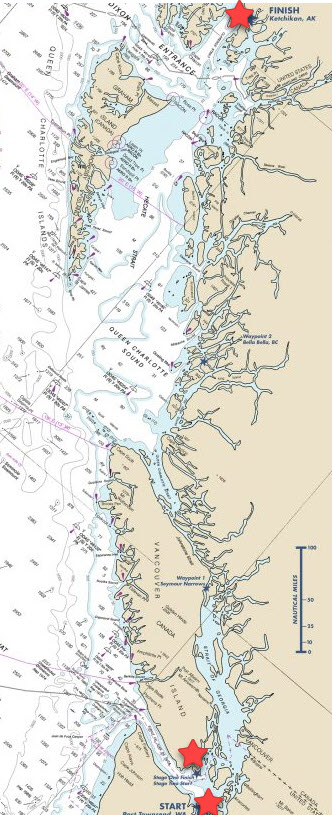 What was to be in 2020:
What was to be in 2020:
Race to Alaska, now in its 6th year, follows the same general rules which launched this madness. No motor, no support, through wild frontier, navigating by sail or peddle/paddle (but at some point both) the 750 cold water miles from Port Townsend, Washington to Ketchikan, Alaska.
To save people from themselves, and possibly fulfill event insurance coverage requirements, the distance is divided into two stages. Anyone that completes the 40-mile crossing from Port Townsend to Victoria, BC can pass Go and proceed. Those that fail Stage 1 go to R2AK Jail. Their race is done. Here is the 2020 plan:
Stage 1 Race start: June 8 – Port Townsend, Washington
Stage 2 Race start: June 11 – Victoria, BC
There is $10,000 if you finish first, a set of steak knives if you’re second. Cathartic elation if you can simply complete the course. R2AK is a self-supported race with no supply drops and no safety net. Any boat without an engine can enter.
In 2019, there were 48 starters for Stage 1 and 37 finishers. Of those finishers, 35 took on Stage 2 of which 10 were tagged as DNF.
Source: Race to Alaska


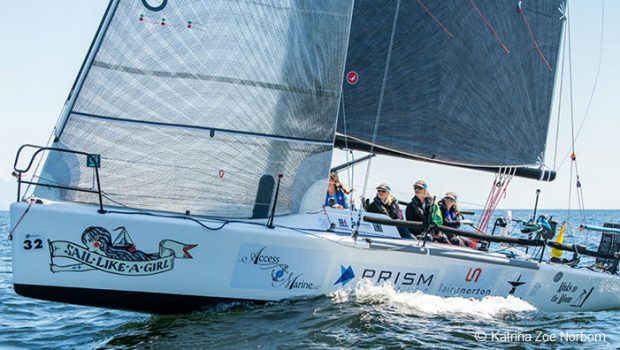


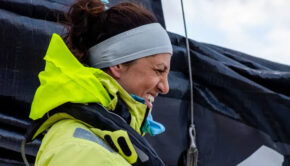
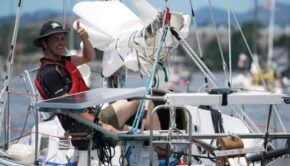
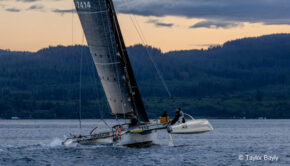
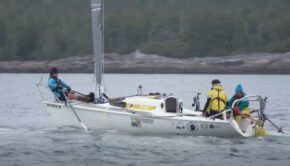
 We’ll keep your information safe.
We’ll keep your information safe.